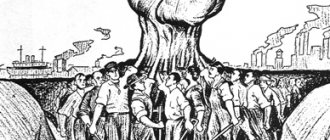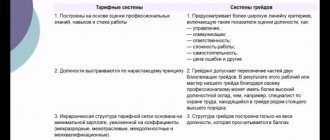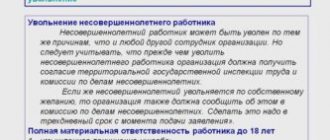In order to prevent disciplinary discord in the process of carrying out work activities or increase labor productivity, the legislation provides for certain disciplinary measures, the use of which properly affects employees of any team. What can they be and how should they be used? More on this later.
Types of disciplinary measures against an employee
In labor legislation, two types are distinguished: rewards and punishments. Moreover, if the first type can be used to reward a conscientious employee and thereby stimulate the work of the entire team in general, then disciplinary measures from the second category are intended to eliminate situations in a group of employees associated with discord in labor activity and violation of labor discipline.
As for the concept of violation of labor discipline, the Labor Code of the Russian Federation does not give its exact definition. The legislator assigns the responsibility for determining this to special bodies working at the enterprise, which are engaged in issuing thanks and imposing penalties. If we think based on the concept of labor discipline, then its violation is recognized as the failure of an employee to fulfill the instructions entrusted to him.
Violation of labor discipline - definition and types
Labor discipline is a set of rules of conduct adopted by the enterprise (labor safety rules, internal labor regulations, corporate ethics, etc.) that are obligatory for all employees of an enterprise (from management to ordinary employees). An important nuance is that the employer is not only obliged to develop and approve such rules, but also to provide conditions for their proper implementation - otherwise, failure to fulfill labor duties and failure to comply with labor discipline is not the fault of the employee.
In order to apply penalties to an employee for a violation, it is necessary to determine what constitutes a violation of labor discipline. And to do this, you first need to clearly understand what is included in the concept of labor discipline.
Responsibilities of the employee
According to the Labor Code of the Russian Federation, an employee is obliged to:
- comply with labor standards established at the enterprise;
- conscientiously perform official duties;
- comply with labor protection rules, internal labor regulations, Regulations on trade secrets and the requirements of other regulatory documents adopted by the enterprise;
- treat the property of the enterprise with care;
- If a situation arises that threatens people’s health or life, or the safety of the enterprise’s property, immediately notify the immediate supervisor.
Violation of any of the above points is considered a violation of labor discipline.
Types of labor discipline violations
Depending on the norms of the labor process, the following three types of violations of labor discipline by an employee are distinguished:
- technological (violation of technological standards);
- violation of subordination and coordination in the process of labor management (violations of management norms);
- violation of working hours and rest time (violation of regime norms).
Thus, the release of defective products due to the fault of an employee will be a technological disciplinary offense, and, for example, absenteeism can be considered a violation of regime norms.
Depending on the type of violation, the causes of the incident are investigated and the necessary documents are collected.
List of labor discipline violations
The main violations of labor discipline are usually considered:
- violation of labor safety rules leading to an accident or incident;
- appearing at the workplace in a state of drug, alcohol or other toxic intoxication;
- absenteeism;
- regular lateness to the start of the working day and after the lunch break;
- leaving work early for lunch breaks and at the end of the shift;
- theft of work property, embezzlement, damage to equipment and other property of the enterprise;
- performance of one’s work duties not in full, not in accordance with established quality criteria (improper performance of one’s duties);
- disclosure of a commercial secret of an enterprise;
- refusal to undergo training or medical examination if this is necessary for the high-quality and qualified performance of work duties;
- immoral act;
- direct disregard of the manager’s orders;
- insubordination;
- deliberate failure to comply with instructions and orders;
- participation in activities that undermine the authority of the leader.
Several absences in a row, appearing at the workplace while intoxicated, theft, forgery of documents, as well as immoral acts are considered a gross violation of labor discipline.
It is also worth remembering that improper performance of duties may be as follows:
- at the place of performance;
- according to the deadline and time of execution;
- by volume of execution;
- according to the form of execution;
- by method of execution;
- by subject of execution.
Acts of violation of labor discipline are called disciplinary offenses.
It is necessary to add that it is necessary to distinguish between the financial liability of employees and disciplinary offenses, since financial liability can occur or continue after the end of the employment relationship if material damage to the enterprise was caused while the employee was listed as an employee of the enterprise.
https://youtu.be/p2yl7lNQxSo
Meaning
In any enterprise, labor discipline is of great importance. First of all, it encourages each employee to fulfill their duties to the fullest, with dedication. In addition, in the process of conducting work, a high level of productivity is achieved, which helps to increase the volume of work of the entire enterprise. This element is considered especially important in factories and industrial enterprises, where it is necessary to accurately complete assigned tasks, allowing for a minimum number of defective elements.
By observing labor discipline, the entire enterprise creates favorable working conditions associated with increasing the level of labor protection for both one employee and the entire team as a whole. Among other things, strictly observed discipline is the key to correctly distributed working time for each employee individually and for the entire team as a whole.
Incentives
The most pleasant incentives for any employee are disciplinary measures. These include the payment of bonuses, the issuance of thanks, the presentation of a certificate, diploma or other award, as well as the fact of promotion on the career ladder. However, these benefits are not available to every employee, but only to the best of the entire team. In this regard, each employee tries to better perform their job duties, which greatly stimulates the work process.
As practice shows, this method works great in large companies, where conscientious work results in career advancement to positions that offer a large salary. Also, as some employers note, one-time bonus payments are an excellent incentive option - in this case, each employee of the team tries to do their job better than their colleague, which in total gives an amazing result for the entire company or any other organization. Often, various organizations offer bonus payments for introducing innovative ideas into their development - this also stimulates the process of increasing production volumes.
Punishments
What refers to disciplinary measures in the form of punishments? The Labor Code offers several options for stimulating the general group of workers and punishing the employee who does not conscientiously perform his duties and does not comply with established discipline. These include comments, warnings, reprimands, orders, as well as removal from office or, in other words, dismissal.
It should be noted that such methods also work well in the scope of labor law, stimulating other employees (including the offender) to no longer spoil the work atmosphere and to focus exclusively on fulfilling their duties.
How to fire an employee for systematic violations of discipline
Labor laws do not allow an employer to fire an employee simply for negligence. First, you will have to apply milder disciplinary measures in the hope of correcting the employee.
You can immediately remove him from the staff only for absenteeism (and even then you will have to comply with a bunch of formalities and waste time).
How to get rid of a quitter and slob legally and in the most correct form?
Grounds for dismissal
Systematic violation of labor discipline consists of two factors:
- a disciplinary sanction has already been imposed on the employee, which has not yet been lifted or extinguished (a reprimand, a regular or severe reprimand);
- the employee again violates discipline or fails to fulfill his duties.
Only if both conditions are met, you (as the employer) can, on your own initiative, terminate the employment contract with the violator. However, there is one catch: disciplinary sanctions must be justified (in accordance with the norms of the Labor Code) and impeccably executed. Many employers have serious problems meeting these requirements.
Time limits for imposing disciplinary sanctions
Disciplinary action must be imposed in compliance with the deadlines established by the Labor Code. There is often confusion with deadlines.
The fact is that you can officially make a reprimand or reprimand within one month from the day you discovered the employee’s misconduct.
However, this period can be extended if the employee was absent at that time for valid reasons - for example, he was sick or was on vacation. Days of illness and legal rest are not taken into account.
However, in any case, you do not have the right to impose a penalty later than six months from the date the employee committed the violation.
If he has been in the hospital all this time or has not taken up his duties for another good reason, it will no longer be possible to reprimand or reprimand him.
You will not be able to impose a penalty even if the fact of violation was not established immediately, but after 6 months (at least).
This period is increased only in cases where the violation is so serious that the law provides for criminal liability for its commission.
https://youtu.be/TUBEvN6ilI4
The penalty is valid for the same 6 months. If you reprimanded an employee, and a few weeks later he again made a gross mistake - this is a “relapse”, in connection with which there is grounds for dismissal. If a person worked conscientiously and without complaints for six months, it is impossible to talk about systematic violation of labor discipline.
Explanatory note and order from the manager
Firstly, before applying “sanctions” you must require an explanatory note from the employee. He has the right to write and submit it within two days.
The two-day period will have to be met in any case, even if the offender immediately refused to provide you with an explanation. What if he changes his mind? By the way, the request for clarification must be sent to the employee in writing.
A verbal demand has no meaning from the point of view of labor law.
Secondly, disciplinary action must be documented. No officially issued order – no violation. Small business owners often neglect what they consider unnecessary “paperwork,” but this can lead to big problems with particularly harmful staff units. It is not enough to accept and print an order to impose a penalty. It is necessary that the offender himself signs for its receipt.
If, after reading the document, the employee refuses to sign, you will have to immediately draw up a corresponding act. This act, confirming the “rebellion” of the violating employee, must be signed not only by you, but also by at least one other employee of the company (the head of the department where the insolent employee works, his colleague or other official).
Justification for the disciplinary measures taken
Theoretically, you can fire a manager for having lunch a couple of times right at his workplace, although this is strictly prohibited by the company’s internal rules.
However, there is a high chance that the offended employee will go straight to court.
The judge is unlikely to consider such a reason sufficient for dismissal, and you will have to reinstate the person at work (and perhaps even pay him compensation).
There is another important point that is often ignored by company management. The employer is obliged to prove that the employee had any idea about his job responsibilities and was familiar with their detailed list.
It is imperative to ensure that each employee not only reads the internal regulations (internal regulations, shift schedule or other documents similar in content), but also confirms this in writing. If the employee is not familiar with the job description against receipt, the court may declare your decision to dismiss for systematic violations illegal.
Let's summarize everything said above:
- upon each violation (lateness, poor customer service, etc.), an explanatory note must be taken from the employee, which he must provide within two working days;
- if after two days the explanatory note does not appear on your desk, this will need to be recorded in a separate written act;
- a reprimand or reprimand can be made only within one month after the violation;
- the employee is obliged to familiarize himself with the order on the application of a disciplinary measure and put his signature under the text of this act;
- the penalty must be justified - its severity is determined by the seriousness of the violation committed.
All these principles must be observed at all times and in all cases.
Common mistakes
Listed above are the fundamental principles that should be followed when terminating an employee. However, entrepreneurs very often make less obvious mistakes, each of which can also become a reason for canceling the dismissal order.
- Dismissal is an independent type of disciplinary sanction. As we remember, an employee cannot be punished twice for the same violation. Sometimes managers first reprimand the offending employee and then immediately fire him. This is a gross violation.
- Regular tardiness very often becomes a reason for dismissal. In small companies, the manager usually immediately notices who has arrived at the wrong time - there are few employees, each of them is visible. But in large organizations equipped with terminals with an electronic security system, the situation becomes somewhat more complicated - you can’t keep track of everyone. It happens that one fine day the employer decides to find out how things are going with absenteeism, checks the data of the access system and sees that one of the employees was late several times in one week. As a result, for the first lateness the employee is reprimanded, and for the second he is immediately fired - and all this with an interval of 10 minutes. Remember: this scheme of action is illegal. In such situations, you will have to limit yourself to a reprimand for all cases of lateness at once. By the way, this principle applies not only to being late, but also to all other offenses. “Wholesale” disciplinary liability is impossible and unacceptable.
- Some employers continue to use a system of fines and deductions from wages. This is illegal - the Labor Code provides for only three types of disciplinary “sanctions”, and a fine is not one of them. Considering an act of unauthorized imposition of a fine as evidence of a systematic violation of discipline by an employee is madness (and administratively punishable). But similar precedents happen even now!
- Another gross violation is the absence in the dismissal order of a direct indication of a specific misconduct. An order with the abstract wording “for systematic violation of labor discipline” can easily be appealed in court.
A little theory
If a dismissed employee believes that he has been treated unfairly, he has the right to apply to the court to appeal the order. To ensure that the case is resolved in its favor, the employer must be aware of what principles the judges are guided by when making a decision.
https://youtu.be/MFkc81yyHuQ
The legislator establishes that the meaning of any disciplinary sanctions is to strengthen labor discipline. Accordingly, with the help of comments and reprimands, the employer must give the employee the opportunity to improve.
If management strives to fire the offender at the first opportunity, there is no need to talk about correction - this means that they are simply planning to get rid of the employee.
From the point of view of the legislator, such aspirations must be suppressed.
Following this logic, judges first of all find out how justified the decision to dismiss for systematic violations of labor discipline was. If they conclude that the punishment does not fit the offense, you will lose the case. An employer who is looking for a reason to get rid of an employee is a priori guilty.
Let's imagine that a person was late, received a reprimand, was late again the next day and was immediately fired. The court's verdict will certainly be disappointing for the employer. What if the employee seriously decided to improve, and he was simply unlucky enough to get caught in a traffic jam on this fateful day? In fact, he had no real opportunity to prove his good intentions in practice.
There is one more nuance. When appealing an order, an employee can draw the court’s attention to the unfoundedness of the penalties imposed on him even before his dismissal.
For example, a couple of months ago an employee was reprimanded for being late, and now you fire him for arguing with a client.
Having proven that you reprimanded him unreasonably or in violation of the established procedure, the cunning employee has a good chance of getting the dismissal decision reversed.
What about trade unions?
If the company has a trade union, then the dismissal will have to be agreed upon with representatives of its elected body. The problem is that it is not always possible to determine whether the person being fired belongs to a union or not. Employees are not required to inform anyone of their membership in such organizations.
If an employee does not admit whether he belongs to a union or not, it is better to notify all unions that operate in the company about the planned dismissal. In this case, you will formally comply with the legal requirement.
Summing up
A huge number of “forcefully” dismissed workers are seeking reinstatement or financial compensation due to the frivolity of their employers. Yes, it is quite difficult to ensure compliance with all the requirements of the Labor Code of the Russian Federation, but it is worth trying.
The reason for an appeal may be an incorrectly drawn up act or not drawn up at all, a small error in an order, or unconvincingly formulated arguments.
To avoid this, always check the “checklist” of necessary actions and the list of common mistakes.
16.06.2015 13:18
Source: https://dezhur.com/mag/kak-uvolit-sotrudnika-za-sistematheskie-narusheniya-discipliny.html
What is taken into account in the process of applying disciplinary measures?
In order to punish an employee, there must be a fact that he has committed a disciplinary offense. What is a disciplinary offense? This is a violation in the process of conducting the work activity entrusted to the employee. An example of this could be lateness, failure to fulfill the assigned plan, failure to comply with subordination, and so on.
In the process of applying such measures, first of all, the employer or body that is authorized to resolve these issues in an organization or enterprise is obliged to pay attention to the degree of seriousness of the offense committed. In addition, it is of great importance whether this is the first time this has happened, or whether the employee systematically demonstrates non-compliance with labor discipline. In the second case, of course, more severe disciplinary measures are taken against the employee.
In addition, the administration must take into account the circumstances under which the offense was committed, the personal qualities of the employee, as well as characteristics from the previous place of work, if any.
When can measures be taken?
Before taking disciplinary measures, the administration of the enterprise or the body authorized to carry out such activities must make sure that no more than a month has passed since the discovery of the offense - otherwise, the application of punishment is considered illegal. At this time, the employee’s periods of vacation or sick leave should not be taken into account. When making a decision to punish an employee, you should also make sure that no more than six months have passed since the commission of the offense (if the situation was discovered through an audit or inspection, no later than two years).
The procedure for bringing disciplinary liability to an employee
Before starting the procedure for imposing a punishment on an employee for a disciplinary offense, the manager must request from him a written explanation of the reasons for the offense. The employee has the opportunity to fulfill this requirement within two days. However, it is also legal to reject this request from the manager. However, refusal to explain the reasons in writing does not mean that the manager does not have the right to impose punishment. This provision is fixed in Art. 193 Labor Code of the Russian Federation.
From the moment a subordinate is caught violating work order, the manager has a month to bring him to justice. It is also necessary to remember that:
- the period when the employer must render a verdict on the application of punishment to the subordinate begins from the date the offense was discovered;
- if the subordinate is away from the workplace (vacation, business trip, sick leave), the designated time is not taken into account. The remaining days that were absent are taken into account in the period for which you are supposed to be responsible;
- The first day of notification of an offense is the one on which the employee’s immediate supervisor becomes aware of it.
Punishments can only be imposed by the head of the company. At the same time, in order to impose official punishment, the manager must have factual and irrefutable evidence of the offender’s guilt.
In practice, the most often used are collections from wages without issuing an order for such an act, which is illegal. Based on Art. 22 of the Labor Code of the Russian Federation, it is prohibited to collect fines from an employee’s salary as punishment for violating labor regulations. However, many managers deprive the employee of a bonus in exchange for a fine.
In order for such a violation to be recorded, the manager publishes an order to hold a specific subordinate accountable. Only on this basis does the subordinate receive punishment.
The procedure for applying penalties
For those groups of workers that do not belong to special groups (employees of railway stations, judges, employees of the prosecutor's office and investigative bodies), a unified procedure for applying penalties is provided. First of all, a representative of the administration or body authorized to conduct such cases is required to issue an order to the enterprise, the content of which states that at a certain time the fact of committing a disciplinary offense was discovered, and also announces the measure chosen for punishment. A copy of this order is given to the guilty employee against a receipt, which must be signed within three days from the date of publication of the document.
If an employee refuses to take note of this circumstance (does not sign), the body is obliged to draw up an appropriate act, where it is necessary to indicate the circumstance of the refusal.
Drawing up an explanatory note when bringing disciplinary action against an employee
Competently writing an explanatory note can not only help the manager fairly punish a subordinate, but also help the employee protect his rights.
Recommendations for drawing up an explanatory note are as follows:
- The subordinate needs to clearly know his rights, as well as the legislative framework of professional relations. An employee’s refusal to provide an explanation of the reasons for unlawful behavior is not a disciplinary violation. Based on Part 1, Art. 193 of the Labor Code of the Russian Federation, requesting an explanatory note is the task of the head of the company. If the subordinate refuses to provide explanations, a corresponding act is drawn up.
- The explanatory note should be as informative and concise as possible, in an official business style, without the use of jargon, slang, etc.
- The best option would be to print the explanatory text and sign it by hand. This will avoid possible confusion with handwriting.
- Proposals should not be formulated in a justificatory form. You should also choose your words as correctly as possible. So, “I was late” is an admission of guilt and a statement of the fact of an offense. At the same time, the word “delayed” means the presence of objective circumstances that prevented a timely appearance at the workplace.
- If other company employees also participated in the offense, the employee is advised not to use accusatory language and rely on facts and not emotions.
Consequences of imposition of a penalty
An order to take disciplinary action has a statute of limitations of one year. After this period, all measures must be canceled. Removal of measures is also carried out on the initiative of the body that imposed them, or the head of the enterprise. If the employee wishes, he can independently contact the official and request the removal of the sanctions, demonstrating his correction. Based on the arguments presented, the body has the right to independently decide whether to refuse or satisfy such a request.
During the year while the order to apply disciplinary measures is in force, the employee cannot be rewarded. Facts of minor offenses for which sanctions are applied are not entered in the work book, but they can be reflected in the reference from the place of work.
Types of penalties
According to Art. 192 of the Labor Code, the following disciplinary measures may be applied to an employee:
- Rebuke.
- Comment.
- Dismissal.
The specified list of disciplinary sanctions is exhaustive and is not subject to broad interpretation.
The employer is obliged to independently choose one of the forms of disciplinary sanctions based on the requirements of labor legislation, the severity of the offense committed, and the consequences of the violation committed.
The punishment must be adequate to the severity of the offense : for minor violations the most lenient punishment is applied. For example, it is not allowed to fire an employee for a simple one-time tardiness. Such dismissal can easily be appealed in court.
As an example of the application of punishment for violation of labor discipline, the following can be applied: for systematically being late to work, an employee may be reprimanded, for being late for 4 or more hours, he may be fired.
For the same offense, only one penalty may be applied to an employee . In particular, it is not allowed to simultaneously announce a reprimand and a reprimand.
The deadlines for bringing an employee to justice are preclusive and cannot be restored. They can be extended for the period the employee is on sick leave or on vacation, or to take into account the opinion of the trade union organization, if necessary.
Comment
A reprimand is the easiest form of disciplinary action for an employee and is widely used in enterprises.
The use of a remark is practiced when an employee first commits an offense that does not entail serious consequences.
Upon the fact of an offense committed by an employee, a report on violation of labor discipline is drawn up, containing the essence of the offense, the explanations received from the employee and the reprimand issued.
This is important to know: How to reduce the amount of recovery under a writ of execution
Usually, the fact of issuing a remark does not threaten any special troubles for the employee , but if labor discipline is repeatedly violated within a year, the employer has the right to dismiss the employee.
Rebuke
A reprimand is a “medium” form of punishment in terms of severity. It is not subject to entry into the work book, but may become the basis for depriving the employee of bonuses.
A reprimand is applied to employees who systematically violate the rules of labor discipline or who have committed actions that have had a negative impact on the work process (in case of constant tardiness, errors in work, incorrect information in documents).
Dismissal
Dismissal is the last and most severe sanction for an employee. It is applied in case of systematic violation of labor discipline by an employee (if, having an outstanding disciplinary sanction, the employee committed it again within a year), as well as in case of a gross disciplinary offense.
The list of possible grounds for bringing an employee to disciplinary punishment in the form of dismissal includes:
- Systematic refusal to perform work , which previously resulted in a reprimand or reprimand (based on clause 5, part 1, article 81 of the Labor Code).
- Committing a serious violation of the employment contract under clause 6, part 1, art. 81 TK.
- Making a decision that led to property losses for the company , if the employee performed management functions in the company, was a deputy manager or chief accountant under clause 9, part 1, art. 81 TK.
- Committing a gross offense under clause 10, part 1, art. 81 Labor Code (this is, for example, absenteeism or showing up at work drunk).
- Loss of trust (in the case of an employee working with material assets) according to paragraphs. 7 hours 1 tbsp. 81 TK.
- Committing an immoral offense by a teacher under clause 8, part 1, art. 81 or a gross violation of the charter of an educational institution under paragraph 1 of Art. 336 TK.
- Violation of anti-doping rules by athletes under Art. 348.11 TK.
Dismissal has no legal basis if it was formalized while the employee was on sick leave, on vacation, or if the employer fired a pregnant woman on his own initiative.
Other forms of penalties
Other forms of disciplinary sanctions are applied to employees if they are provided for by federal special laws. For example, a form of punishment such as a severe reprimand is applied to customs officers, civil servants and military personnel, and deprivation of badges or a reduction in class rank is applied to employees of the prosecutor's office. Prosecutors and customs officials may also be given a warning for incomplete official compliance.
When imposing a penalty, you need to take into account the specifics of the employee’s work . For example, it is permissible to dismiss an employee in the teaching field for committing an immoral offense, while other workers cannot be fired for this.
Dismissal
Dismissal or removal from a position is the most severe sanction provided for by labor legislation. It is used only in the event of a gross violation of one’s official duties or in the event that the competent authorities identify an employee’s inadequacy for the position held.
As a result of dismissal, the employee ceases his activities at this enterprise or organization. Only the body that hires employees has the right to apply such a penalty.
The Russian Labor Code contains a reference to a list of professions whose representatives may be removed from their positions not only as a result of systematic disciplinary offenses, but also after a single case of gross violation. An example of this would be when a railway station employee poses a threat to the safe passage of trains. In addition, this sanction can be applied to a financially responsible person in whom, on certain grounds, trust in the storage of monetary or other types of valuables has been lost.
Types of disciplinary liability: general and special
By general disciplinary liability it is legitimate to understand the obligations that are established by the provisions of the Labor Code of the Russian Federation for all employees - regardless of what kind of work they perform and in what industry.
In turn, the special disciplinary responsibility of an employee is the duties that complement those that form the general responsibility under the Labor Code of the Russian Federation, based on the effect of individual legal acts. These acts may relate to:
1. With a certain type of economic activity of the employing company (sector of the economy).
Examples of industry regulations, including disciplinary liability:
- Law of January 10, 2003 No. 17-FZ “On Railway Transport”;
- Law of November 21, 1995 No. 170-FZ “On the use of atomic energy”.
2. With a certain departmental vertical within which the employer operates.
If we talk about the sources of law where departmental special disciplinary responsibility is established, examples can be highlighted, for example, the following:
- Disciplinary Charter of the Customs Service (approved by Decree of the President of the Russian Federation of November 16, 1998 No. 1396);
- Disciplinary charter of internal affairs bodies (approved by Decree of the President of the Russian Federation of October 14, 2012 No. 1377);
- Law “On the Prosecutor’s Office” dated January 17, 1992 No. 2202-1.
3. With responsibilities stipulated by various industry-wide standards, the implementation of which requires increased discipline, and failure to comply entails economic and social risks.
Examples of such regulations are Fire Safety Rules, the Law on the Protection of Personal Data dated July 27, 2006 No. 152-FZ, etc.
We note that in accordance with Art. 192 of the Labor Code of the Russian Federation, special disciplinary liability can be established by several types of regulations at once - federal laws, charters, as well as internal regulations on discipline. Each of them, therefore, must be adapted to a specific industry, to a specific departmental vertical or to an area of activity where “increased” discipline is required.
Thus, taking into account the place and role of the employer - an organization or government agency, in the relevant industries and “verticals”, certain types of special disciplinary liability are applied. In practice it could thus be:
- Departmental. That is, to reflect the responsibilities determined in the order of departmental subordination (for example, when the head of a regional department is accountable to the head of a federal department, and he can fire the former for one or another offense).
- Industry. That is, to reflect the responsibilities determined by industry specifics (reflected in the standards establishing the procedure for bearing responsibility for workers in a particular sector of the economy).
- Industry-wide based on special standards. That is, standards establishing “increased” discipline in certain areas of the performance of labor functions by employees.
Thus, the main difference between general disciplinary responsibility and special one is in the circle of persons who fall under the rules establishing one or another type of responsibility. General liability applies to all persons. Special - only for those specified in a specific regulatory act.
Special liability takes precedence over general liability (and this is a general pattern for the branch of law as a whole, when special rules are applied first, and general ones second). Accordingly, the rules of general liability apply if those that can be attributed to the area of special responsibility do not apply.
Appeal
The application of such measures can be appealed by an employee of the enterprise personally to the State Labor Inspectorate or by filing an application in court. The body where this decision of the organization’s management can be challenged is also labor dispute commissions, which are created mainly at large enterprises.
Cases on such issues are considered collegially, after all explanations have been submitted by the employee and the employer. After studying all the facts brought to the attention of the commission, its members are obliged to make a general decision, which can be either upholding the complaint or refusing it.
In the event that this commission has identified a violation on the part of the head of an enterprise or body authorized to apply disciplinary measures related to the application of punishment, the guilty person must be promptly removed from his position by the body superior to him.
What is not considered a measure of influence?
Disciplinary measures are a very good lever in moving an enterprise in the right direction of development. However, in addition to this, there are other ways to stimulate employees of an institution or organization, which at first glance may seem like measures of influence, but in fact they are not. They are also presented in labor legislation. These, for example, include partial deprivation of bonuses or those measures that were applied for violations in other areas of his activity, but not labor (for example, in everyday life, administrative offenses, etc.).
If, within the time period specified by law, the employee was not informed that disciplinary measures had been taken against him, they are also considered invalid. In addition, the announcement of their presence must be made exclusively by written notification, signed by the employee himself. The section of labor law on disciplinary measures also states that if the statute of limitations on the issued order has expired, or the offense has been annulled or repaid, then the sanction is also considered withdrawn.
Penalties for violations of labor discipline
p>The penalties that the employer has the right to apply to the employee are prescribed in Article 192 of the Labor Code of the Russian Federation. These include:
At the same time, the employer also has the right to deprive the employee of a bonus (as part of a reprimand, if such a procedure is reflected in the internal documents of the enterprise).
For a certain category of employees whose labor duties are regulated by separate Federal laws, other penalties are also provided.
This is important to know: Federal Law on Special Assessment of Working Conditions 426 Federal Law
Reprimand for violation of labor discipline
Upon the fact of an employee’s misconduct, an act of violation of labor discipline must be drawn up, which must reflect the essence of the offense, the explanations received from the employee and the remark received. The remark in itself does not threaten the employee with any special troubles, but it will be possible to talk about a systematic violation of labor discipline if the employee commits another disciplinary offense in the near future.
Reprimand for violation of labor discipline
A reprimand is issued for a disciplinary crime (misdemeanor) committed and can be ordinary or severe. The reprimand is not entered in the work book, but is recorded in the order; it is noted in the work book only if the employee is fired for improper performance of job duties and systematic violation of labor discipline.
Dismissal for violation of labor discipline
Dismissal is a last resort measure. It can be applied in the event of a systematic violation of labor discipline by an employee and failure to fulfill his duties, as well as in the event of a gross disciplinary offense.
For example, educational institutions may fire an employee who has committed an immoral act.
Responsibility for violation of labor discipline
According to labor legislation, each employee is responsible for maintaining labor discipline at the enterprise and each employee must be familiarized with the internal labor regulations, labor protection documents, job descriptions and other documents regulating his work activities, upon signature. If an employee violates labor discipline, the employer has the right to apply penalties at its discretion, depending on the severity of the offense.
The procedure for punishment for a disciplinary offense
The punishment for violation of labor discipline is established by the head of the enterprise on the basis of legal norms and available information.
Act on committing a disciplinary offense
When an employee commits any disciplinary offense, a corresponding act is drawn up. The document is drawn up by the employee’s immediate supervisor in the presence of two witnesses in two copies (one immediate supervisor passes it on to senior management to make a decision on penalties, the other copy is handed over to the employee). The form of the act and the employees responsible for drawing up the act must be approved by the internal labor regulations of the enterprise.
Employee's explanations
The employee is required to provide a written explanation regarding the disciplinary offense he has committed (it is recommended to require an explanation in writing so that this fact is recorded). If the employee refuses to give an explanation, this must be reflected in the act. The employee is given two days to provide explanations. It is worth mentioning that refusal to write an explanatory note will not save the employee from being sanctioned.
If the employee has provided an explanatory note, an act of violation and a report from the employee’s immediate superior are attached to it. This package of documents is transferred to senior management in order for a decision on recovery to be made.
Order to impose a penalty
After studying the circumstances of the disciplinary offense committed and studying all the documents, the head of the enterprise issues an order on violation of labor discipline.
There is no standard form for such an order (except for the dismissal order, which is drawn up according to forms No. T-8 and No. T-8a, approved by Resolution of the State Statistics Committee of Russia dated January 5, 2004 No. 1 “On approval of unified forms of primary accounting documentation for labor accounting and its payment"), but the document must reflect the disciplinary offense, the time and date of its commission, the type of penalty and list the regulatory documents. The collection order must contain the visas of the head of the enterprise, the head of a structural unit (or the immediate supervisor of the employee), as well as the head of the personnel department.
The Labor Code on violation of labor discipline states that such an order is not reflected in the employee’s work book (except for dismissal). A copy of the order can be filed in the employee’s personal file. Also, the employee must be familiar with the order for collection against signature within three days.
Let us remember that the penalty must be justified, and its severity must be proportionate to the gravity of the offense committed.
Order to lift a disciplinary sanction
By decision of the management, a disciplinary sanction can be lifted within a calendar year, for which a corresponding order is drawn up. The document must reflect the basis and reason for lifting the penalty. The procedure for familiarizing an employee with such an order is the same as when familiarizing himself with an order of collection.
If within a year the penalty has not been lifted, but during this time the employee has not committed a single disciplinary offense, the penalty is canceled automatically and is considered as if the employee had never received it.
Time limits for imposing penalties
The employer must impose a penalty on the offending employee within a month from the date of the offense. Later than six months from the date of commission of the offense, punishment cannot be applied; if the offense was discovered during an inspection or audit, the period is increased to two years.
It should also be noted that the employer cannot impose two punishments for the same offense and cannot impose a fine for violation of labor discipline. In this case, deduction of bonuses is not a fine, since the bonus is a means of encouraging employees.










